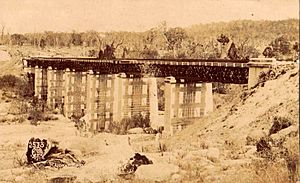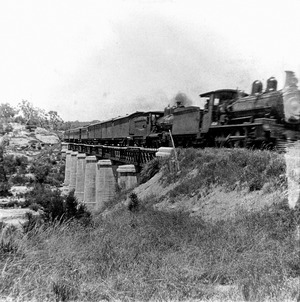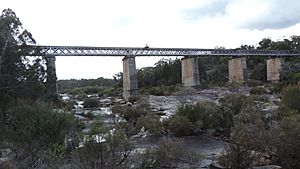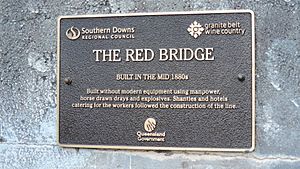Quart Pot Creek Rail Bridge facts for kids
Quick facts for kids Quart Pot Creek Rail Bridge |
|
|---|---|
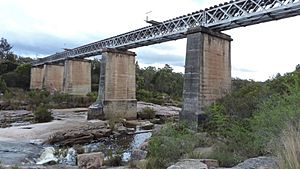
Quart Pot Creek Rail Bridge, viewed from upstream, 2015
|
|
| Location | Quart Pot Creek, Stanthorpe, Southern Downs Region, Queensland, Australia |
| Design period | 1870s - 1890s (late 19th century) |
| Built | 1886 |
| Official name: Quart Pot Creek Rail Bridge | |
| Type | state heritage (built) |
| Designated | 21 October 1992 |
| Reference no. | 600829 |
| Significant period | 1880s (fabric) |
| Significant components | abutments - railway bridge, pier/s (bridge) |
| Lua error in Module:Location_map at line 420: attempt to index field 'wikibase' (a nil value). | |
The Quart Pot Creek Rail Bridge is a special railway bridge located at Quart Pot Creek in Stanthorpe, Australia. It was built a long time ago, in 1886. People sometimes call it the Red Bridge. This bridge is so important that it was added to the Queensland Heritage Register on 21 October 1992, meaning it's protected for future generations.
Contents
Building the Quart Pot Creek Rail Bridge
The Quart Pot Creek Rail Bridge was built in 1886. It was a key part of the railway line that connected Brisbane in Queensland to Sydney in New South Wales. This was a very important link for travel and trade between the states.
Why the Railway Was Needed
Stanthorpe became a busy place in 1872 because of tin mining. People found a lot of valuable tin in the area. The towns of "Quart Pot Creek" and "Stannum" grew quickly due to this mining boom. Stanthorpe was unique on the Darling Downs because its growth came from mining, not just farming.
Connecting the States by Rail
The Quart Pot Creek Rail Bridge is part of the Southern railway line. This line connects Toowoomba to Warwick and then to Wallangarra. The railway reached Warwick in 1871. It was extended to Stanthorpe in 1881 to help the tin industry.
The railway then continued to the border with New South Wales. The Quart Pot Creek Bridge was built as part of this important extension. Plans for the bridge were first drawn in 1880. The final building plans were ready in 1884. The railway line between Stanthorpe and Wallangarra opened on 4 February 1887. Wallangarra was a special "change of gauge" station at the border.
Interstate train services began on 16 January 1888. This connected Brisbane with Sydney, Melbourne, and Adelaide. Over time, the bridge was made stronger. In 1904, plans were made to allow heavier trains to use the line. Work to strengthen the Warwick-Wallangarra section started in 1910. In 1913, one part of the bridge (span No.7) was braced. This allowed it to handle even heavier train loads.
What the Bridge Looks Like
The Quart Pot Creek Rail Bridge is made up of seven sections. Each section is about 15.2 meters (50 feet) long. These sections use strong metal girders, which are like large beams. The bridge rests on six concrete pillars and two end supports called abutments.
The total length of the bridge is about 106.7 meters (350 feet). Some parts of the bridge, like the middle girders and the tops of the pillars, have been changed over time. One section (No.7) has been specially braced to make it stronger. The bridge carries a single railway track that is 1.07 meters (3.5 feet) wide.
There is a special plaque on the bridge. This plaque explains why the bridge is historically important.
Why the Bridge is Important
The Quart Pot Creek Rail Bridge was added to the Queensland Heritage Register on 21 October 1992. This means it meets certain important standards.
A Piece of Queensland's History
This bridge is a significant part of Queensland's history. It was once a vital link between Brisbane and Sydney. It is also the fourth oldest bridge of its kind in Queensland.
A Great Example of Engineering
The bridge shows excellent engineering design. It was built so strongly that it could be updated over the years. Even with these updates, it has kept its original look and feel.
 | Chris Smalls |
 | Fred Hampton |
 | Ralph Abernathy |


